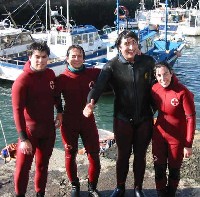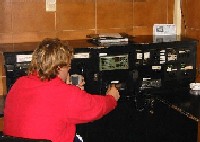Home
Main
THE STATION
Where are we
The station
History
THE TEAM
The crews
Training
Exercises
IN ACTION
The fleet
Divers
Covered area
events
SOS CALLS
Rescues
The System
Press
WE NEED YOU
Join us
Help us
Links
E-Mail
|
|
THE
CREWS
Our crews
are formed by volunteers.
This means
that they do not get any kind of money for the important tasks they perform.
| At the moment,
the staff of the Sea Rescue Station of Arriluze is formed by 60 volunteers,
taking in account both crew members and radio operating personnel, all
off them with different backgrounds in their normal life's.
Between them,
we can find fishermen, merchant sailors, engineers, doctors, graphic designers,
cookers, lumberjacks, salers, waiters, students... |
 |
Most
of them begin with with very little nautical knowledge, but all of them
get properly formed and trained in order to confront all the risky situations
in which they could get involved... And most important: All of them perform
they duties with big will.
Positions
On a lifeboat,
there are different positions between the crew, and each volunteer will
perform the task for which most and better skills has achieved. In any
case, most of our volunteers keep going in a non stopping learning process
and are now capable to work in more than one position, and some are able
for all of them.
The main four
different positions on a rescue boat are those that follow:
| Skipper |
|
Sailor |
The person
in charge of the ship, and therefore responsible for all what happens on
board.
Apart from the titulations
required by law, they must pass an internal formation process to gain knowledge
about the material, the coast and their colleagues. |
|
In charge
of the operations on board, such as mooring, assistance to the crew working
in the water, towing arrangements...
Sailors must be bold on
knots, towing lengths, performance of the ship, parts of the lifeboat,
arrangement of equipment, 1st aid material... |
| Lifeguards |
|
Divers |
They perform
the water operations; these are the ones jump into the sea when necessary.
They hold the Aquatic Rescuer
titulation but they also need to know how to use the equipment, and most
important: To know and relay on their colleagues. They normally work in
pairs. |
|
They work
in very specific situations, performing underwater search and rescues.
The proper diving titulation
is compulsory, but they also have to participate on the training sessions
celebrated periodically.
They always work in a team
due to the special risk implied on their duties. |
Apart
from the actual crew there is another group of volunteers which is extremely
important for the success of any emergency response: The radio operators.
These
volunteers watch for the safety of all the crew members previously mentioned,
specially on those situations on which they risk their life's to save others'.
|
Radio
Operator
The
fact that they do not board the lifeboat does not mean their task is less
important at all.
These
are the ones co-ordinating the whole operation by constantly controlling
the situation and position of the resources on duty, as well as the conditions
at the emergency site. |
 |
| They
also keep the communication and co-ordination with other possibly required
resources as ambulances, police, firefighters,... |
If
you would also like to be part of our team, just go to our JOIN
US
section. |
|
2006
Weekend Shifts
|
April - May
01-02 Teams 3/2
08-09 Team 4
15-16 Team 5
22-23 Team 1
29-30 Teams 2/3
May
06-07 Team 4
13-14 Team 5
20-21 Team 1
27-28 Teams 3/2
June
03-04 Team 4
10-11 Team 5
17-18 Team 1
24-25 Teams 2/3
July
01-02 Team 4
08-09 Team 5
15-16 Team 1
22-23 Teams 3/2
29-30 Team 4
August
05-06 Team 5
12-13 Team 1
19-20 Teams 2/3
26-27 Team 4
September
02-03 Team 5
09-10 Team 1
16-17 Teams 3/2
23-24 Team 4
30-01 Team 5
October
30-01 Team 5
07-08 Team 1
14-15 Teams 2/3
21-22 Team 4
28-29 Team 5
November
04-05 Team 1
11-12 Teams 3/2
18-19 Team 4
25-26 Team 5
December
02-03 Team 1
09-10 Teams 2/3
16-17 Team 4
23-24 Team 5
30-31 Team 1
Weekend shifts start Friday at 22:00 until Sunday at 21:00.
|
|

